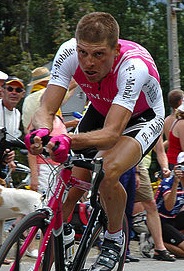 Wednesday may have been a rest day for the peloton, but for the data nerds, it was Fight Night. Statistical Skier, getting in some off-season training, made a deeper investigation into my question on the increased GC impact of downhill finishes this year, and found some tentative support for my thesis. Junk Charts, meanwhile, did some meta-analysis of Statistical Skier, and pulled up another set of TdF data visualizations as well.
Wednesday may have been a rest day for the peloton, but for the data nerds, it was Fight Night. Statistical Skier, getting in some off-season training, made a deeper investigation into my question on the increased GC impact of downhill finishes this year, and found some tentative support for my thesis. Junk Charts, meanwhile, did some meta-analysis of Statistical Skier, and pulled up another set of TdF data visualizations as well.
But the main event among the stat-heads, as it always seems to be these days, was the battle over how to interpret the latest batch of power and performance data from this year’s Tour de France.
Science of Sport posted SRM numbers from Chris Horner and Chris Anker Sorenson over several climbs at this year’s Tour. The wattage information seemed to reveal both that increasing duration of effort on mountaintop finishes corresponded to a lower power output, and that after the pacesetters fall off their tempo on the climbs, the GC favorites actually slow down and regroup a bit before the attacks begin.
You’d think these two nuggets of information (or at least the first) would be fairly obvious, but in the past, the performance dip has been smaller or curiously absent in the world’s biggest bike race. While I’m cautiously optimistic that reduced doping has a hand in this, I’m similarly cautious of interpolating drug use—or the lack thereof—from performance data.
I’m especially disheartened in Dr. Tucker’s note, comparing the Tourmalet times from Stage 16 with those from 2003, that “the race situation was different, but 12 minutes? That’s too big to be accounted for by strategy alone, even weather conditions”. It shows a pretty serious lack of appreciation for the differences in those two days, and indeed, for the way bike racing works in general.
Stage 16 prior to the this year’s first Tourmalet ascent featured the hardest action of this years Tour de France in its vicious first hour, followed by the pack absolutely tossing out the anchor once Armstrong’s group was clear. A group that varied in size from two to nine riders—not all great climbers, and none going full-out, I might add—put some six-and-a-half minutes into the peloton over the hors categorie climb.
 Behind them, the pack crested at a pace so relaxed (4.7 w/kg for C-A Sorenson, and he was in the wind setting tempo) that Norwegian flank steak Thor Hushovd was able to ride up a ways, attack, give up, get caught, and hang in with the peloton over the summit. Compare this to ’03, when T-Mobile set a full-gas pace up the Tourmalet, before Jan Ullrich made a bold, if short-sighted attack some 8km from the summit that managed to temporarily displace even Armstrong.
Behind them, the pack crested at a pace so relaxed (4.7 w/kg for C-A Sorenson, and he was in the wind setting tempo) that Norwegian flank steak Thor Hushovd was able to ride up a ways, attack, give up, get caught, and hang in with the peloton over the summit. Compare this to ’03, when T-Mobile set a full-gas pace up the Tourmalet, before Jan Ullrich made a bold, if short-sighted attack some 8km from the summit that managed to temporarily displace even Armstrong.
The the impacts of tactics on performance in cycling, especially in stage races, are simply unlike like any other sport—there’s no bottom to performance when the race situation becomes static and the peloton calls off a chase. As I said before, I’m hopeful a more human approach to race preparation creates more incentive for the peloton to relax like this, but I think comparing a performance on a stage that is de facto neutralized to one where the entire Tour hangs in the balance is tremendously misleading. Be it twelve minutes or two hours, data from tactically-dead kilometers are essentially useless.
Conventional wisdom holds that Oscar Pereiro won the 2006 Tour de France because Floyd Landis tested positive for drugs. But the only reason Pereiro—a second-tier GC rider—was there to catch the crown is because he and Jens Voigt decided to go out and crank watts on a day when the rest of the field sat up; the folly of inferring doping from Pereiro’s time gain, or cleanliness from the peloton’s pedestrian tempo, is patently obvious.
Don’t get me wrong: I think the Science of Sport blog is fantastic, and that statistical analysis of hard data is one of the few reliable windows we have into a world characterized by secrecy, silence, and misdirection. I also think there’s tremendous merit to many of the inferences they draw.
But in this quest for fact, I think that many analysts ignore or underutilize fairly obvious data—the night/day difference between the ’03 and 2010 Tourmalet ascents, for example, or the fact that Carlos Sastre, who started the climb well behind the GC favorites, may have equaled or exceded Contador’s widely-criticized performance on Verbier.
It’s good that the statisticians offer disclaimers for uncontrolled variables, but in some cases the impact of these variables precludes the analysis entirely.
“Your words”
” Don’t get me wrong: I think the Science of Sport blog is fantastic, and that statistical analysis of hard data is one of the few reliable windows we have into a world characterized by secrecy, silence, and misdirection. I also think there’s tremendous merit to many of the inferences they draw.”
Copied the data from chris into one of my blogs today but couldn’t get the chart across, still learning new tricks as i watched the “pros ” pedal through the gloom.
Glad i was warned at 7am of the snow since i had planned to give Sarkozy the “Livestrong bracelet”, the start area was a maelstrom but still managed a few words with Moreau and Carlos before the off!
Don’t know tomorrow’s weather but i go regardless as 3 nights in one place can grow on you and i want to be in Bordeaux tomorrow night to try and find George the Cyclist who flies the coop from there?
I’m with you on the wordy and overly simplified comparisons made in cycling forums/blogs. Every time a post starts comparing years, I stop reading.
Cycling is not baseball, it’s not really possible to collect stats. Context really, really matters in cycling performance. The best one can do is “He’s good climbs with many short steep pitches. That other guy is better on steady climbs.”
I do make an effort to find power data from events if it is available and then get a sense of rider performance that way. (ex. Science of Sport)
Funny, I had nearly the same reaction to that lazy “12 minutes” line when I read that post. And I don’t really have much cycling knowledge to back it up with. I mean, how much cycling do you have to follow to catch on to the fact that 12 minutes gaps can appear/disappear pretty quick in stage racing, regardless of terrain?
I’m sure you were just trying to illustrate two points with one picture, but Ullrich was riding for Bianchi in ’03. Go Ulle!
Enjoy all the way of cycling race. good views !”It’s good that the statisticians offer disclaimers for uncontrolled variables, but in some cases the impact of these variables precludes the analysis entirely.”